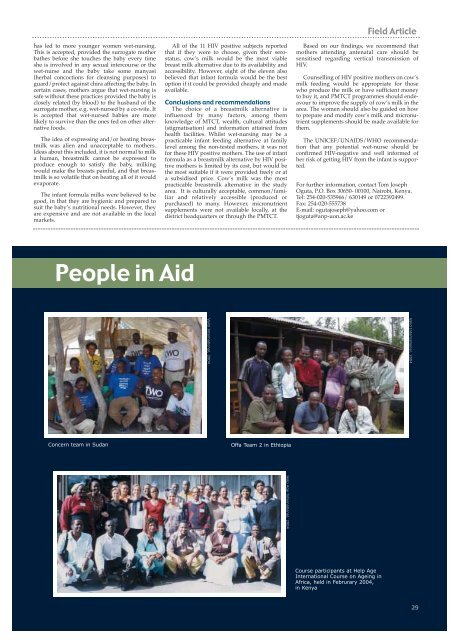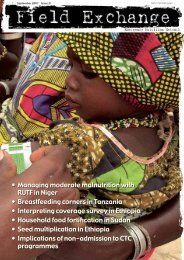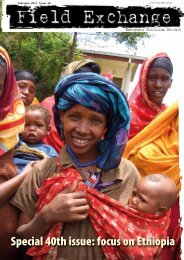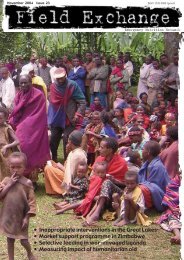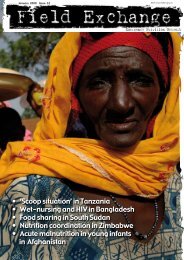<strong>Field</strong> Articlewere using different feeding methods - see table1 for infant feeding options considered 3 . Two ofthe four women were HIV positive, of whom oneopted for infant formula and one continuedbreastfeeding. The remaining two were nottested for HIV- the first used cow’s milk to feedher infant, while the second woman was a wetnurse.Culture and knowledge of HIV/AIDS andMTCTThe respondents were asked a number ofquestions about HIV/AIDS, e.g. whether it ispreventable and curable, and possibility of transmissionfrom mother to child. The key-informantsand members of the FGD were also askedfor differences, or similarities, between AIDS andchira (see Table 2)The FGDs found that women do not haveauthority over their sexual lives. The Luo culturalnorms demand that a woman must haveparticular sexual contact with her husband tomark certain events like planting, harvesting,marriage and death rituals. One womancomplained loudly:“How can you stop the spread of HIV/AIDS whensome of our men move all over the villages inheritingwidows even where it was stronglysuspected the husbands died of AIDS? To makeit worse, they do it secretly and the wife only discoverslater when the damage has been caused!”Alternative infant feeding practicesamongst case studiesThe four case studies are summarised in Table3, and illustrate alternative feeding methods aspracticed in the study area. They show examplesof cow’s milk feeding, wet-nursing, formulafeeding and breastfeeding among those withunknown sero-status and confirmed sero-statuscases of HIV.The four case studies looked at socio-economicprofile, feeding choice, health and environmentconditions, and knowledge of MTCT.Education varied from no formal education tosecondary level. Number of births ranged from1 – 11. Feeding choices were influenced by practicalities(e.g. mother died and so was wetnursed, or infant formula was provided free andso was used) and social influences (e.g. HIVpositive mother feared stigmatisation if she didnot breastfeed). The household conditions variedfrom poor, to acceptable. The health and nutritionalstatus of the infants also varied, fromwasted to well nourished. Three of the fourwomen had good knowledge of how HIV maybe transmitted in breastmilk and how feedingchoice can influence transmission. All acceptedcow’s milk and milk powder based feeds, andinfant formula as feeding alternatives. Three ofthe four accepted wet nursing, while only oneaccepted expressed breast milk/heat treatedmilk as an option.Infant feeding practice and beliefsamongst the HIV-positive mothers(Homa-Bay District Hospital)Cow’s milk feeding was practiced bythe majority of the HIV-positive mothersas an alternative to breastfeeding.Knowledge regarding dilution was verypoor, with some mothers over-dilutingand others over-concentrating renderingthe practice inappropriate.Attitudes to surrogate breastfeedingare governed by rigid cultural norms. It isbelieved that a wet-nurse should not havesexual intercourse until the baby is oldenough (about 3 years), otherwise thebaby, if touched (‘soiled’) by such aperson, would die. Consequently, elderlywomen who have reached menopause arepreferred as carers, in the belief that theyare more likely to abstain from sexualintercourse.However, the increase innumbers of orphans due to HIV/AIDS3The PMTCT programme provided free infantformula and ARV only to mothers who wereregistered into the programme and counselled atthe district hospital. However, the case studiesincluded other women who did not have access tofree infant formula supplies.Table 3Summary of case studiesCharacteristicsCasesCase ICase IICase IIICase IVSocio-economicprofile• Aged 210• Married, polygamous family• Primary education• Peasant farmer with annualincome of about Ksh.12,000 (US$ 155)• Given birth 3 times and haslost 2, last born, a boy was3 weeks old• Aged 27• Married, monogamous• Secondary education• Runs a business with annualincome of more than Ksh.60,000 (US$ 770)• Given birth 4 times all alive.Last born 5 years old.Surrogate daughter is 2months• Aged 21• Married, monogamous• Primary education• Runs retail business withannual income of aboutKsh. 15,000 (US$ 195)• Given birth once, first born,a boy aged one month• Aged 34• Married, monogamous• No formal education• House wife with annualfamily income of about Ksh.24,000 (US$ 308)• Given birth 11 times andhas lost 4, last born, a boywas 2 months old.Feeding choice• Cow milk, due to breastinfections• Baby has never beenbreastfed• Milk is donated bygrandmother• Milk is boiled and dilutedwith a pre- boiled water• Dilution ratio is 1:1• Fed on demand using aspoon• Left- over taken by themother• Wet-nursing, mother diedafter delivery• Has to bathe and take acleansing herbal concoctionbefore she can breastfeedthe surrogate daughter• Introduced cow milk aftergrowth faltering• Milk is bought, boiled anddiluted with pre boiledwater• Dilution ratio is 1:1• Baby fed 8 times a dayusing a cup• Left-overs taken by otherchildren• Breastfeeding• Fears not to breastfeed forpossible stigmatisation bycommunity and hostilityfrom the spouse• Breastfeed on demand• Good attachment, butsuckling is not effective• Complements with cow milkdue to growth faltering• Milk is bought, boiled anddiluted with a pre- boiledwater• Dilution ratio is 1:1• Milk is fed 3 times a dayusing a cup• Left- over taken by themother• Infant formula• Opted for on advice fromthe hospital• Formula is donated by thehospital freely• Feed reconstituted with apre- boiled water and fedon demand using a cup• Occasionally boiled water isgiven to the baby• A few times the baby hassuckled from his motherwhile she is asleep• Left- over taken by themotherHealth/environmentalconditionsMTCTKnowledge• Mother non- tested for HIV• Mother is sickling andsuffers breast infections• Delivered under a TBA, birthweight not established• Baby looks healthy, but hasnot received anyimmunization• Latrine available, butmother does not was herhands regularly• Drinking water fetched froma borehole is not treated• Has some knowledge aboutMTCT but does not know itis preventable• Accepts wet-nursing,formula, cow milk and milkpowder as possible feedingalternatives• Surrogate mothernon- tested for HIV• Mother is well and healthy• Baby has episodes ofdiarrhoea and slow growth• From a birth weight of 2.7kg, the baby weighs 4.1 kgafter 6 weeks• Mother maintains highsanitary and hygienicconditions• Has high knowledge aboutMTCT- timing oftransmission and prevention• Accepts wet-nursing,formula, cow milk and milkpowder as possible feedingalternatives• Mother is sero-positive forHIV and counselled• Mother looks healthy andpositive• Baby is withdrawn andwasted• From a birth weight of2.9 kg, the baby’s weight isdown to 2.7 kg after 6weeks• Baby has thrush in themouth• Mother maintains highsanitary and hygienicconditions• Has high knowledge aboutMTCT- timing oftransmission and prevention• Accepts formula, cow milk,milk powder andexpressed/heat treatedbreast milk as possiblefeeding alternatives• Mother is sero-positive forHIV and counselled• Both look healthy andpositive• Baby has normal growth• Mother maintains highsanitary and hygienicconditions• Has high knowledge aboutMTCT- timing oftransmission and prevention• Accepts formula, cow milk,and milk powder as possiblefeeding alternatives28
has led to more younger women wet-nursing.This is accepted, provided the surrogate motherbathes before she touches the baby every timeshe is involved in any sexual intercourse or thewet-nurse and the baby take some manyasi(herbal concoctions for cleansing purposes) toguard/protect against chira affecting the baby. Incertain cases, mothers argue that wet-nursing issafe without these practices provided the baby isclosely related (by blood) to the husband of thesurrogate mother, e.g. wet-nursed by a co-wife. Itis accepted that wet-nursed babies are morelikely to survive than the ones fed on other alternativefoods.The idea of expressing and/or heating breastmilkwas alien and unacceptable to mothers.Ideas about this included, it is not normal to milka human, breastmilk cannot be expressed toproduce enough to satisfy the baby, milkingwould make the breasts painful, and that breastmilkis so volatile that on heating all of it wouldevaporate.The infant formula milks were believed to begood, in that they are hygienic and prepared tosuit the baby’s nutritional needs. However, theyare expensive and are not available in the localmarkets.All of the 11 HIV positive subjects reportedthat if they were to choose, given their serostatus,cow’s milk would be the most viablebreast milk alternative due to its availability andaccessibility. However, eight of the eleven alsobelieved that infant formula would be the bestoption if it could be provided cheaply and madeavailable.Conclusions and recommendationsThe choice of a breastmilk alternative isinfluenced by many factors, among themknowledge of MTCT, wealth, cultural attitudes(stigmatisation) and information attained fromhealth facilities. Whilst wet-nursing may be apracticable infant feeding alternative at familylevel among the non-tested mothers, it was notfor these HIV positive mothers. The use of infantformula as a breastmilk alternative by HIV positivemothers is limited by its cost, but would bethe most suitable if it were provided freely or ata subsidised price. Cow’s milk was the mostpracticable breastmilk alternative in the studyarea. It is culturally acceptable, common/familiarand relatively accessible (produced orpurchased) to many. However, micronutrientsupplements were not available locally, at thedistrict headquarters or through the PMTCT.<strong>Field</strong> ArticleBased on our findings, we recommend thatmothers attending antenatal care should besensitised regarding vertical transmission ofHIV.Counselling of HIV positive mothers on cow’smilk feeding would be appropriate for thosewho produce the milk or have sufficient moneyto buy it, and PMTCT programmes should endeavourto improve the supply of cow’s milk in thearea. The women should also be guided on howto prepare and modify cow’s milk and micronutrientsupplements should be made available forthem.The UNICEF/UNAIDS/WHO recommendationthat any potential wet-nurse should beconfirmed HIV-negative and well informed ofher risk of getting HIV from the infant is supported.For further information, contact Tom JosephOguta, P.O. Box 30650- 00100, Nairobi, Kenya.Tel: 254-020-535966/ 630149 or 0722392499.Fax: 254-020-555738E-mail: ogutajoseph@yahoo.com ortjoguta@anp-uon.ac.ke7People in AidValid International, 2004Valid International, 2004Concern team in SudanOffa Team 2 in EthiopiaHelp Age International, 2004Course participants at Help AgeInternational Course on Ageing inAfrica, held in Februrary 2004,in Kenya29


